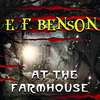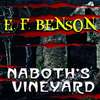Kitabı oku: «Dodo: A Detail of the Day. Volumes 1 and 2», sayfa 7
"Jack, it is good of you to come so soon," he said; "Dodo has missed you dreadfully. Have you seen the boy? Dodo, may I have him down?"
"Oh, he's been down," said she, "and has only just gone up again. He's rather fractious to-day. I daresay it's teeth. It's nothing to bother about; he's as well as possible."
Lord Chesterford looked disappointed, but ac-quiesced.
"I should like Jack to see him all the same," he remarked. "May he come up to the nursery?"
"Oh, Jack doesn't care about babies," said Dodo, "even when they belong to you and me. Do you, Jack? I assure you it won't amuse you a bit."
"I can't go away without seeing the baby," said Jack, "so I think I'll go with Chesterford, and then I must be off. Good-bye, Dodo. Get well quickly. May I come and see you to-morrow?"
"I wish Chesterford wouldn't take Jack off in that way," said Dodo rather querulously, as they left the room. "Jack came to see me, and I wanted to talk more to him – I'm very fond of Jack. If he wasn't so fearfully lazy, he'd make no end of a splash. But he prefers talking to his friends to talking to a lot of Irish members. I wonder why he came after he said he wouldn't. Jack usually has good reasons."
Dodo lay back in her chair and reflected.
"You really are the most unnatural mother," said Mrs. Vivian, with a laugh. "I am glad Mr. Broxton went with your husband, or he would have been disappointed, I think."
Dodo looked a little anxious.
"He wasn't vexed, was he?" she asked. "I hate vexing people, especially Chesterford. But he really is ridiculous about the baby. It is absurd to suppose it is interesting yet."
"I don't suppose he would call it interesting," said Mrs. Vivian. "But you know there are other things beside that."
Dodo grew a trifle impatient.
"Ah, that's a twice-told tale," she said. "I consider I have done my duty admirably, but just now I confess I am pining for a little amusement. I have been awfully dull. You know one can't exist on pure love."
Mrs. Vivian rose to go.
"Well, I must be off," she said. "Good-night, Dodo; and remember this, if ever anything occurs on which you want advice or counsel, come to me for it. You know I have been through all this; and – and remember Lord Chesterford loves you very deeply."
Dodo looked up inquiringly.
"Yes, of course, I know that," she said, "and we get on magnificently together. In any case I should always ask you for advice. You know I used to be rather afraid of you."
Mrs. Vivian stood looking out of the window. Her eyes suddenly filled with tears.
"Ah, my dear, don't be afraid of me," she said.
Dodo wondered, when she had gone, what made her so suddenly grave. Her own horizon was singularly free from clouds. She had been through an experience which she had looked forward to with something like dread. But that was over; she and the baby were both alive and well. Chesterford was more devoted than ever, and she? – well, she was thoroughly satisfied. And Jack had come back, and all was going delightfully.
"They all talk about love as if it were something very dreadful," she thought. "I'm sure it isn't dreadful at all. It is rather a bore sometimes; at least one can have enough of it, but that is a fault on the right side."
The door opened softly, and Chesterford came in.
"I am glad to find you alone, darling," he said, "I haven't seen you all day. You are looking much better. Get Jack to come and see you again as soon as he can."
Dodo smiled benignantly on him.
"The baby really is wonderful," he continued. "It was sitting up with its bottle just now, and I really believe it winked at me when it saw me. Do you think it knows me?"
"Oh, I daresay it does," said Dodo; "it sees enough of you anyhow."
"Isn't it all wonderful," he went on, not noticing her tone. "Just fancy. Sometimes I wonder whether it's all real."
"It's real enough when it cries," said Dodo. "But it is rather charming, I do think."
"It's got such queer little fists," said he, "with nice pink nails."
Dodo laughed rather wearily.
"Are you a little tired, darling?" he said. "Won't you go to bed? You know you've been up quite a long time. Perhaps you'd like to see the baby before you go."
"Oh, I said good-night to the baby," said Dodo. "I think I will go to bed. I wish you'd send Wilkins here."
He bent over her and kissed her forehead softly.
"Ah, my darling, my darling," he whispered.
Dodo lay with half-shut eyes.
"Good-night, dear," she said languidly.
CHAPTER EIGHT
The questions about which a man is apt to, say that he alone can judge, are usually exactly those questions in which his judgment is most likely to be at fault, for they concern him very intimately – a truth which he expresses by saying that he alone can judge about them, and for that very reason his emotions are apt to colour what he considers his sober decision.
Jack was exactly in this position when he left the Chesterfords' door that afternoon. It was only six o'clock when he went away, and he wished to be alone, and to think about it. But the house seemed stuffy and unsuggestive, and he ordered a horse, and sat fuming and frowning till it came round. It fidgeted and edged away from the pavement when he tried to mount it, and he said, "Get out, you brute," with remarkable emphasis, and asked the groom whether he hadn't yet learned to hold a horse quiet. This was sufficient to show that he was in a perturbed frame of mind.
The Row was rather empty, for a great race meeting was going on, and Jack cantered quickly up to the end, and cursed his stupidity for not having gone to Sandown. Then he put his horse to a quiet pace, and determined to think the matter out.
He had left the Chesterfords in January with a full realisation of his position. He was in love with Dodo, perhaps more deeply than ever, and Dodo was hopelessly, irrevocably out of his reach. The only thing left to be done was to get over it; but his ordinary circle and its leisurely duties were quite impossible just at present, and he adopted the traditional English method of travelling, and shooting unoffending animals. Whether the absence of faith was responsible, is an open question; at any rate, the remedy did not result in a cure. He was intensely bored with foreign countries; they were quite as distasteful as England, and, on the whole, had less to offer. And he came back to London again as suddenly as he had left it. He only remembered one incident in his four months abroad which gave him any pleasure; that was when he received a letter from Dodo at Berlin, which said nothing particular, and wound up with a little mild chaff on the absurdity of his going abroad at all. "I hope you are really better," wrote Dodo, "though I didn't know that you were in any immediate danger of breaking down when you left us. Anyhow, come back. London is particularly wholesome, and, to tell you the truth, it's just a wee bit dull. Don't be conceited."
Of course he came back; it was no good remaining abroad, and yawning in front of the Sistine Madonna, who, in her impossible serene mildness, had no message whatever for him. He wanted to see Dodo; why on earth shouldn't he? She was the only thing he really cared about, and she was quite out of his reach. Where was the harm?
For two days after his arrival in London he was still undecided, and made no effort to see her, and on the third day her note came. London was as bad as Dresden, and again, where was the harm? He wrote a note saying he would come, then he tore that up and sent a refusal, offering no excuse; and after all, he had gone, and parted from her with the words that he would come again the next day. But ah, how sweet it was to see her again! Such were the facts upon which Jack wished to form a conclusion. All this indecision was really too annoying. What was the use of a conscience that took the sugar out of your tea, and yet could not prevent you from drinking it? It was not strong enough to prevent him going to see Dodo, and it took the malicious line of making the visit as little enjoyable as possible. Well, it must be settled one way or the other.
The problem obviously depended on one question. Did his desire for Dodo grow stronger with seeing her? He decided that it did not make much difference to the quality or degree of his longing, but, on the other hand, her society gave him an inestimable pleasure. When she had refused him a year ago, he had gone on seeing her day after day, without the horrible, unsatisfied emptiness he had felt abroad. That absorbing craving for her, he remembered, began when she was on her wedding tour. Then why not see her freely and frequently? No harm could possibly come out of it. Dodo, he thought, cared for him only as she cared for a dozen other friends, why should he, then, who cared so deeply for her, cut himself off from her? Again his deep-rooted affection and respect for her husband was an immense safeguard. Quixotism was a doubtful virtue at the best, and decidedly out of date, and besides, what would Dodo think if she suddenly found that one of her best friends invariably declined to meet her under any circumstances? She would certainly guess the reason, and if there was one possible solution of this stupid problem more undesirable than another, it was that. And Jack made up his mind.
Well, that was settled, and here was Bertie riding down upon him. He felt as if he wished to record a deliberate and sober conclusion. They joined forces and rode up together.
Then Jack said suddenly, —
"Bertie, I have been making a fool of myself, but I am better now."
"That's good," said Bertie placidly.
There was something indefinably soothing about Bertie's manner. Jack determined to be more explicit. It is often a relief to tell a friend one's own resolutions, especially if one does not expect unseasonable objections.
"It's about Dodo," he said. "You see I'm dreadfully in love with her. Awkward, isn't it?"
"Devilish," said Bertie, without a shade of emotion passing over his face.
"And the less I see of her," said Jack, "the worse I get, so I've determined that the more I see of her in the ordinary way, the better. It sounds an unusual treatment, I know, but you must acknowledge I gave the other method a fair chance. I went and killed pigs in Austria, and climbed the Matterhorn, but it wouldn't do."
They rode on a little time in silence. Then Bertie said, —
"Do you want my advice?"
"Well, yes," said Jack rather dubiously.
"Then I'm dashed if I like it, Jack," he said. "It's too dangerous. Just think – "
But Jack broke in, —
"Don't you see my friendship for Chesterford is an absolute safeguard. Dodo gives me more pleasure than anyone I know, and when I can't see her, life becomes unbearable. Chesterford is one of those men to whom one couldn't do a mean thing, and, furthermore, Dodo doesn't love me. If those two facts don't ensure safety, I don't know what would. Besides, Bertie, I'm not a rascal."
"I can't like it," said Bertie. "If one has a propensity for falling into the fire, it's as well to keep off the hearthrug. I know you're not a rascal, but this is a thing one can't argue about. It is a matter of feeling."
"I know," said Jack, "I've felt it too. But I think it's outweighed by other considerations. If I thought any mischief could come of it, I should deserve to be horse-whipped."
"I don't like it," repeated Bertie stolidly.
Jack went to see Dodo the next afternoon, and for many afternoons during the next fortnight he might have been seen on Chesterford's doorstep, either coming or going. Her husband seemed almost as glad as Dodo that Jack should come often. His visits were obviously very pleasant to her, and she had begun to talk nonsense again as fluently as ever. With Jack, however, she had some rather serious talks; his future appeared to be exercising her mind somewhat. Jack's life at this time was absolutely aimless. Before he had gone abroad he had been at the Bar, and had been called, but his chambers now knew him no more. He had no home duties, being, as Dodo expressed it, "a poor little orphan of six foot two," and he had enough money for an idle bachelor life. Dodo took a very real interest in the career of her friends. It was part of her completeness, as I have said before, to be the centre of a set of successful people. Jack could do very well, she felt, in the purely ornamental line, and she by no means wished to debar him from the ornamental profession, but yet she was vaguely dissatisfied. She induced him one day to state in full, exactly the ideas he had about his own future.
"You dangle very well indeed," she said to him, "and I'm far from wishing you not to dangle, but, if it's to be your profession, you must do it more systematically. Lady Wrayston was here yesterday, and she said no one ever saw you now. That's lazy; you're neglecting your work."
Jack was silent a few minutes. The truth of the matter was that he was becoming so preoccupied with Dodo, that he was acquiring a real distaste for other society. His days seemed to have dwindled down to an hour or two hours each, according to the time he passed with Dodo. The interval between his leaving the house one day and returning to it the next, had got to be merely a tedious period of waiting, which he would gladly have dispensed with. In such intervals society appeared to him not a distraction, but a laborious substitute for inaction, and labour at any time was not congenial to him. His life, in fact, was a series of conscious pulses with long-drawn pauses in between. He was dimly aware that this sort of thing could not go on for ever. The machine would stop, or get quicker or slower, and there were endless complications imminent in either case.
"I don't know that I really care for dangling," said Jack discontentedly. "At the same time it is the least objectionable form of amusement."
"Well, you can't dangle for ever in any case," said Dodo. "You ought to marry and settle down. Chesterford is a sort of apotheosis of a dangler. By performing, with scrupulous care, a quantity of little things that don't matter much, like being J.P., and handing the offertory plate, he is in a way quite a busy man, to himself at least, though nothing would happen if he ceased doing any or all of these things; and the dangler, who thinks himself busy, is the happiest of men, because he gets all the advantages of dangling, and none of the disadvantages, and his conscience – have you got a conscience, Jack? – so far from pricking him, tells him he's doing the whole duty of man. Then again he's married – to me, too. That's a profession in itself."
"Ah, but I can't be married to you too," remarked Jack.
"You're absurd," said Dodo; "but really, Jack, I wish you'd marry someone else. I sha'n't think you unfaithful."
"I don't flatter myself that you would," said Jack, with a touch of irritation.
Dodo looked up rather surprised at the hard ring in his voice. She thought it wiser to ignore this last remark.
"I never can quite make out whether you are ambitious or not," she said. "Now and then you make me feel as if you would rather like to go and live in a small cathedral town – "
"And shock the canons?" suggested Jack.
"Not necessarily; but cultivate sheer domesticity. You're very domestic in a way. Bertie would do admirably in a cathedral town. He'd be dreadfully happy among dull people. They would all think him so brilliant and charming, and the bishop would ask him over to dine at the palace whenever anyone came down from London."
"I'm not ambitious in the way of wanting to score small successes," said Jack. "Anyone can score them. I don't mind flying at high game and missing. If you miss of course you have to load again, but I'd sooner do that than make a bag of rabbits. Besides, you can get your rabbits sitting, as you go after your high game. But I don't want rabbits."
"What is your high game?" asked Dodo.
Jack considered.
"It's this," he said. "You may attain it, or at any rate strive after it, by doing nothing, or working like a horse. But, anyhow, it's being in the midst of things, it's seeing the wheels go round, and forming conclusions as to why they go round, it's hearing the world go rushing by like a river in flood, it's knowing what everyone thinks about, it's guessing why one woman falls in love with one man, and why another man falls in love with her. You don't get that in cathedral towns. The archdeacon's daughter falls in love with the dean's son, and nobody else is at all in love with either of them. The world doesn't rattle in cathedral towns, they take care to oil it; the world doesn't come down in flood in cathedral towns, there is nothing so badly regulated as that. I don't know why I should choose cathedral towns particularly to say these things about. I think you suggested that I should live in one. If you like you can plunge into the river in flood and go down with it – that's what they call having a profession – but it's just as instructive to stand on the bank and watch it; more instructive, perhaps, because you needn't swim, and can give your whole attention to it. On the whole, that is what I mean to do."
"That's good, Jack," said Dodo; "but you're not consistent. The fact that you haven't been going out lately, shows that you're standing with your back to it, with your hands in your pocket. After all, what you say only conies to this, that you are interested in the problem of human life. Well, there's just as much human life in your cathedral town."
"Ah, but there's no go about it," said he. "It's no more like life than a duck pond is to the river in flood."
"Oh, you're wrong there," said Dodo. "It goes on just the same, though it doesn't make such a fuss. But in any case you are standing with your back to it now, as I said."
"I'm going into details, just at present," said Jack.
"How do you mean?"
"I'm watching a little bit of it."
"I suppose you mean Chesterford and me. Do you find us very interesting?" demanded Dodo.
"Very."
Jack was rather uncomfortable. He wanted to say more, and wished he hadn't said so much. He wondered how Dodo would take it.
Dodo did not take it at all. She was, for the time at any rate, much more interested in Jack's prospects as they concerned him, than as they bore on herself.
"What is the upshot of all your observations?" she asked.
Jack hardly knew whether to feel relieved or slighted. Was Dodo's apparent unconsciousness of the tenor of what he had said genuine or affected? On that he felt a great deal depended. But whether it was genuine or not, the matter was closed for the present. Dodo repeated her question.
"My observations on you, or on the world in general?" he asked.
"Either will do," said Dodo; "we're very normal. Any conclusion you have formed about the rest of the world will apply to us."
"My conclusion is that you are not quite normal," said he.
Dodo laughed.
"Oh, I'm dreadfully normal," she said; "all my inconsistencies lie on the surface – I'm married, I've got a baby, I'm honest, I'm lazy. I'm all I should and shouldn't be. And Chesterford – "
"Oh, then Chesterford's normal too," said Jack.
CHAPTER NINE
June was drawing to a close in a week of magnificent weather. It was too hot to do much during the middle of the day, and the Park was full of riders every morning from eight till ten. Dodo' was frequently to be seen there, usually riding a vicious black mare, that plunged and shied more than Lord Chesterford quite liked. But Dodo insisted on riding it.
"The risks one runs every moment of one's life," she told him, "are so many, that one or two more really don't matter. Besides, I can manage the brute."
On this particular morning Dodo descended the stairs feeling unusually happy. The period of enforced idleness was over, and she was making up for lost time with a vengeance. They had given a dance the night before, and Dodo had not gone to bed till after four; but for all that she was down again at half-past eight, and her mare was waiting for her. She turned into the dining-room to have a cup of tea before starting, and waited somewhat impatiently for Lord Chesterford to join her. He came in, in the course of a few minutes, looking rather worried.
"You look as if you had not gone to bed for a week," said Dodo, "and your hair is dreadfully untidy. Look at me now. Here I am a weak little woman, and I feel fit to move mountains, and you look as if you wanted quinine and iron. Don't come, if you'd rather not. Stop at home and play with the baby."
"I'm all right," said he, "but I'm rather worried about the boy. The nurse says he's not been sleeping much all night, but kept waking and crying, and he looks rather flushed. I think I'll send for the doctor."
Dodo felt a little impatient.
"He's as right as possible," she said. "You shouldn't worry so, Chesterford. You've wanted to send for the doctor a hundred times in the last month, either for him or me. But don't come if you'd rather not. Vivy is coming to breakfast at half-past nine; I quite forgot that. If you feel inclined to stop, you might give her breakfast, and I'll lengthen my ride. I shall be back at half-past ten. She's going to take me to see Wainwright's new Turner."
"Are you sure you don't mind, Dodo?" said he, still wavering. "If you don't, I really think I will stop, and perhaps see the doctor about him. The nurse says she would like to have the doctor here."
"Just as you like," said Dodo. "You'll have to pay a swinging bill anyhow. Good-bye, old boy. Don't worry your silly old head. I'm sure it's all right."
Dodo went off perfectly at ease in her mind. Chesterford was rather fussy, she thought, and she congratulated herself on not being nervous. "A pretty pair we should make if I encouraged him in his little ways," she said to herself. "We should one of us, live in the nursery." She put her horse into a quick trot, and felt a keen enjoyment in managing the vicious animal. The streets were somewhat crowded even at this hour, and Dodo had her work cut out for her.
However, she reached the Park in safety, and went up the Row at a swinging gallop, with her horse tearing at the rein and tossing its head. After a time the brute grew quieter, and Dodo joined a well-known figure who was riding some way in front of her.
"Good old Jack," she cried, "isn't it splendid! I had no idea how I loved motion and exercise and dancing and all that till I began again. Didn't you think our ball went off rather well? Did you stop, to the end? Oh, of course you did. That silly dowager What's-her-name was quite shocked at me, just because we had the looking-glass figure in the cotillion. It's the prettiest of the lot, I think. Old Major Ewart gave me a pair of ivory castanets with silver mountings last night, the sweetest things in the world. I really think he is seriously gone on me, and he must be sixty if he's an hour. I think I shall appeal to Chesterford for protection. What fun it would be to make Chesterford talk to him gravely like a grandson. He stopped at home this morning to look after the baby. I think I shall get jealous of the nurse, and pretend that he's sweet on her, and that's why he goes to the nursery so much."
Jack laughed.
"Between you, you hit the right average pretty well," he said. "If it wasn't for Chesterford, the baby would certainly have fallen downstairs half a dozen times. You don't half realise how important he is."
"Oh, you're entirely wrong, Jack," said Dodo calmly. "It's just that which I do recognise; what I don't recognise is that I should be supposed to find ineffable joys in watching it eat and sleep and howl. You know one baby is very much like another."
"In other words, supposing the boy had no expectations," said Jack, "and was not the heir-apparent of half Staffordshire, you would find him much less interesting."
"Would you think me very heartless if I said 'Yes'?" asked Dodo.
"Well, I never held a very high opinion of your heart, you know," said Jack, laughing, "and I don't know that I think much worse of it now."
"You judge so stupidly," said Dodo; "you elevate matrimony into a sacrament. Now I don't. It is a contract for mutual advantage. The husband gives wealth, position and all that, and the wife gives him a housekeeper, and heirs to his property. Don't frown, Jack. That's my eminently common-sense view of the question. It answers excellently, as I find by experience. But, of course, there are marriages for love. I suppose most of the lower middle-class marry for love, at least they haven't got any position or wealth to marry for. But we, the disillusioned and unromantic upper classes, see beyond that. I daresay our great grandfathers married for love, but the fact that so many of us don't, shows that ours is the more advanced and probably correct view. You know all wine-tasters agree on the superiority of one wine, and the inferiority of another. That's the result of education. The amateur thinks they are all more or less alike, and very probably prefers some sweet bad kind. That's the middle-class view of love-marriages. The more I think of it, the more I feel that love is an illusion. Think of all the people who marry for love, and get eternally tired of each other afterwards. They can't keep it up. The lovers grow into friends, and the friends into enemies. Those are the enviable ones who remain friends; but it is better to marry as a friend than as a lover, because in the latter case there is a reaction and a disappointment, which may perhaps ruin the friendship. Aren't I a wise woman, Jack? I think I shall set up a general advice office."
Jack was, rather pale, and his fingers twitched nervously at his reins.
"Have you never felt that illusion?" he asked, in a low voice.
"Really, Jack," said Dodo, "you behave as if you were the inquisition. But I don't see why I shouldn't tell you. For Chesterford I never have. He is the most excellent husband, and I esteem and admire him immensely. Don't make your horse so fidgety, Jack. As I was saying, I don't see why I shouldn't tell you, considering you proposed to me once, and confessed to the same illusion yourself. Have you got over it, by the way? If I had married you, you certainly would have by this time."
There was a long pause. Then Jack said, —
"No, Dodo, I have never got over it."
The moment after he had said it, he would have given his right hand to have it unsaid. Dodo was silent for a moment, and Jack found himself noticing the tiny, trivial things about him. He observed a fly trying to alight oh his horse's ear, but the animal flicked it off with a little jerk, before it got fairly settled. He wondered whether the fly had illusions about that ear, and whether it imagined that it would be happy for ever and ever, if it could once settle there.
"You know we are saying the most frightfully unconventional things to each other," said Dodo. "I am very sorry for you, Jack, and I will administer consolation. When I said 'No' to you, I did it with real regret, with quite a different sort of feeling to that which I should have had if I had said 'No' to Chesterford. It was quite an unreasonable feeling, I couldn't define it, but I think it must have been because – "
Then Jack recovered his self-respect in a moment, by one of those strange contradictions in our nature, which urged him to stop his ears to what, a week before, he had been almost tempting her to say.
"Ah, stop, stop," he said, "you don't know what you are saying. Dodo, this won't do. Think of Chesterford."
"Chesterford and the baby," said Dodo softly. "I believe you are right, Jack. This is unprofitable. But, Jack, since we renounce that, let us still be friends. Don't let this have made any difference to us. Try and realise that it is all an illusion."
Dodo half turned towards him, with a long glance in her brown eyes, and a little smile playing about her mouth.
"Yes, yes," said Jack, laughing nervously. "I told Bertie so the other day. I have been a madman for half an hour, but that is over. Shall we turn?"
They wheeled their horses round, and cantered down the Row.
"Oh, this beautiful world," exclaimed Dodo. "You've no idea what it is to me to come out of the house again, and ride, and dance and sing. I really believe, Jack, that I enjoy things more than anyone else I know. Everything that enjoys itself appeals to me. Jack, do enjoy yourself, although we settled you mustn't appeal to me. Who is that girl standing there with the poodle? I think I shall get Chesterford to buy me a poodle. There's a woman next her awfully like Vivy, do you see, shading her eyes with her hand. It is Vivy."
Dodo's face suddenly grew grave and frightened. She reined her horse in opposite to where Mrs. Vivian was standing.
"Quick, quick," she said, "tell me what has happened!"
Mrs. Vivian looked up at Dodo with infinite compassion in her eyes.
"Dodo, darling," she said, "give your horse to the groom. Please help her to dismount, Mr. Broxton."
Dodo got off, and Mrs. Vivian led her to a seat. Dodo had a sudden flash of remembrance of how she had sat here with Jack a year ago.
"Tell me quickly," she said again.
"My poor Dodo," said Mrs. Vivian, softly stroking the back of Dodo's hand. "You will be brave, won't you? It is worth while being brave. It is all over. The baby died this morning, half an hour after you had gone."
Dodo's first feeling was one of passionate anger and resentment. She felt she had been duped and tricked in a most unjustifiable manner. Fate had led her to expect some happy days, and she had been cruelly disappointed. It was not fair; she had been released from two tedious months of inactivity, only to be caught again. It was like a cat playing with a mouse. She wanted to revenge herself on something.
"Oh, it is too awful," she said. "Vivy, what can I do? It is cruel." Then her better nature came to her aid. "Poor Chesterford, poor dear old boy," she said simply.
Mrs. Vivian's face grew more tender.
"I am glad you thought of him," she said. "His first thought was for you. He was there all the time. As soon as it was over he said to himself, 'Please, God, help Dodo to bear it.' You bear it very well, dear. Come, the carriage is waiting."










